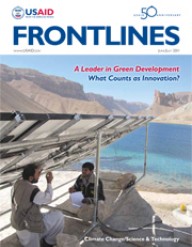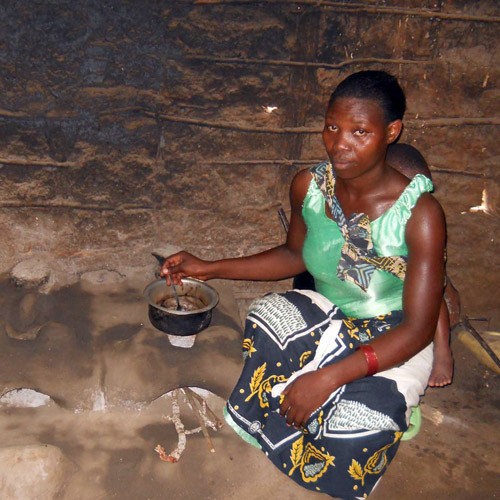 Giraffes inside the Saadani National Park, Tanzania
ELIN TORELL, BALANCED PROJECT
Giraffes inside the Saadani National Park, Tanzania
ELIN TORELL, BALANCED PROJECT
 Giraffes inside the Saadani National Park, Tanzania
ELIN TORELL, BALANCED PROJECT
Giraffes inside the Saadani National Park, Tanzania
ELIN TORELL, BALANCED PROJECT
Rukia Seif spends much of her day cooking for her husband and three girls in her rural Tanzanian home next to the Saadani National Park, an area rich in biodiversity near the Indian Ocean shores. The chore is more enjoyable now that she uses a fuel-efficient stove that produces less smoke.
“I can even wear my best clothes and put on some lip shine when I use this stove, because it does not foul up the air,” Seif explains with a laugh.
Costing less than $2 to build, the mud stove uses less fuel than earlier models, and thus helps sustain forests for future generations. The older models' appetite for fuel was helping destroy the neighboring national park, where community members cut wood for fuel even though it is not allowed. Reducing the demand for wood as fuel also reduces greenhouse gas emissions from deforestation.
Fuel-efficient stoves are better for the environment and for her family's health, and Seif wants others to know about it. As part of the USAID-funded BALANCED (Building Actors and Leaders for Advancing Community Excellence in Development) Project, she received training and now works as a population, health, environment (PHE) peer educator teaching fellow community members about simple things they can do to improve their lives.
The United Nations recently released new world population numbers, projecting they will reach 7 billion this October and at least 9.3 billion by 2050. Most of that growth will occur in developing countries. In remote, rural areas of high biodiversity, communities often lack access to most basic health services, including family planning, resulting in high unmet need for family planning and large family sizes, which in turn places unsustainable pressure on natural resources to provide food and livelihoods.
PHE is an integrated approach to meeting rural community needs for family planning, basic health, and natural resource management. Integration is a key aspect of these programs, which makes the approach more effective and sustainable than delivering the same services in stand alone or parallel programs. The underlying goal is to simultaneously improve access to health services, including family planning, while also helping communities to manage the natural resources upon which they depend, and reduce greenhouse gas emissions from deforestation.
BALANCED works in five wards in Tanzania's Pangani District to train PHE-oriented community-based distributors, providers (small shop owners), and adult peer educators to deliver integrated messages about family planning, health, and conservation in their communities. PHE providers sell condoms and the distributors offer free family planning services, including referrals within their villages. The fuel-efficient cooking stoves are sold at a minimal price, and the seller makes a small profit. Since the project began three years ago, 192 mud cooking stoves have been built in Pangani District.
“In rural settings such as Pangani District, the PHE approach makes sense,” said Heather D'Agnes, a PHE technical adviser for USAID. “Addressing these health and environment problems in an integrated way not only addresses these basic development challenges, but results in additional benefits such as freeing up time and interest for women to participate in traditionally male-dominated natural resources management activities or engaging men in family planning.”
Seif, who is 37 years old, meets and talks with people in her village every day. Her message is clear: fuel efficient stoves and family planning are simple solutions to improving health and protecting the environment.
By planning their families, women improve both their own health and the health of their children. Seif and her husband used contraceptive pills before they decided to have their last daughter. Now they use condoms as a back-up while she is breastfeeding.
“I talk to my peers about planning their families so we have enough natural resources to meet the needs of the villagers who depend on these resources,” Seif added. “Also, when you plan your family, you will get more time to perform other activities.”
Her work is paying off: Seif said she has referred many of her peers to community-based distributors for family planning services in her village. Also, 10 distributors and five village leaders have joined the group of people who use fuel-efficient stoves in her village.










Comment
Make a general inquiry or suggest an improvement.